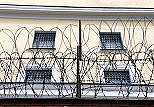Risky Business
Entrepreneurs Suffer Most from Legal Woes in Russia
Tai Adelaja - Russia Profile - russiaprofile.org - 4.9.12 - JRL 2012-65
Russia's business climate remains high-risk even for entrepreneurs with modest ambition and restrained appetites. There is a 50-percent chance that any entrepreneur doing business in Russia will sooner or later end up behind bars, a panel of experts concluded at an April 5 conference examining the country's socio-economic development over the past ten years. Up to 16 percent of the country's entrepreneurs have been prosecuted in the past decade and no less than two-thirds of companies that ran afoul of the law have been closed, the experts concluded.

file photoAt the very core of all business issues in Russia is a lack of trust, said the experts, who were speaking at the International Academic Conference on Economic and Social Development organized by Moscow's respected Higher School of Economics. "There is a perception in government that business people are dishonest," said Yevgeny Yasin, former Russian Minister for the Economy and Higher School of Economics professor. "Sadly, this appears to be the prevailing mindset."
That mindset also appears to have been enshrined in the country's legal code. Since 1996, the laws governing economic and financial crimes in Russia have been toughened with the addition of 12 new provisions, Vedomosti reported, each of which carry punishments of 5-10 years in prison. By contrast, in recent years the government has adopted only two laws to ease Russia's business climate: one that banned the pre-trial detention of people suspected of economic crimes and another requiring that a tax audit be conducted before tax evasion charges can be filed, said Viktor Burobin, head of Justina law firm.
Russia's culture of the presumption of guilt is also reflected in the outcome of court cases involving businesses. The acquittal rate for economic crimes in Russia is just 0.3 percent, compared to up to four percent in former Soviet economies like Georgia, Poland and Ukraine, said Vadim Volkov, the scientific director of the Institute of Law Enforcement. The results are an illustration of Russia's high incarceration rate of 600 prisoners to 100,000 inhabitants, as opposed to 300 in Ukraine and 200 in Bulgaria, said Volkov.
Years of legal pressure on entrepreneurs may have reduced the level of business activity in the country by about half, Yasin said. In boom years, low levels of business activity were compensated for by high oil revenues. Without rising global oil prices and changes in legal policy toward businesses, the Russian economy may only grow by 1.2 percent annually, he said.
About two million Russians have lost their jobs over the past several years as a result of systematic persecution of businessmen by state officials and law enforcement agencies relying on draconian laws, said Leonid Grigoriyev, a professor at the Higher School of Economics. Firmly established businesses were more regularly subjected to prosecutions, according to a research by the Center for Legal and Economic Research, cited by Vedomosti on Friday. About 47 percent of prosecuted entrepreneurs had been in business for over ten years while 32 percent have been entrepreneurs for more than 20 years, said the report.
Such persistent intimidation and